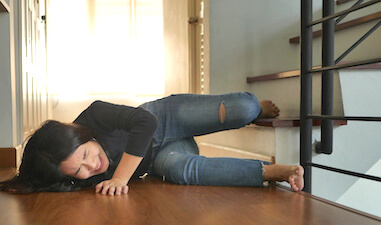This section tells you about the Pompe Support Team, and has information provided by them which will be of particular interest to newly diagnosed Pompe people.
Preventing falls is part of Pompe disease
The message
- Falling IS NOT part of living with Pompe disease.
- Preventing falls IS part of living with Pompe disease.
The Pompe Support Team is very keen to help people with Pompe disease avoid injury from a fall and avoid slips, trips and stumbles.
Too many people accept falls and near misses as part of their condition, which they need not be.
Let’s learn from our own community
Sam Murduck is an Occupational Therapist, who also has Pompe disease.
Sam says:
“I know when I am at more risk of falls and I avoid those situations.
“When I am tired I am at more risk. The other thing I do that really helps is to leave extra time to do jobs or get to places, as I know that when I have to rush I’m more likely to hurt myself.
“I advise many people about using aids and equipment. I use them myself and thankfully have prevented falls and the resulting injuries.”
At risk situations
People with Pompe disease tend to fall when they are:
- Tired
- In a hurry
- Not focussed
- Turning around
- Carrying something
- More stiff (in the mornings)
- More fatigued (in the evenings)
- In unfamiliar places
Falls Awareness Booklet
Download our falls prevention booklet that has been put together specifically for people with Pompe.
An informative guide to help prevent falls.
AGSD-UK Conference 2019
During the Pompe workshops at the conference we had a presentation from John Foxwell about his experience of the course mentioned opposite. John created a small handout about the course for those attending the conference.
Andrew Oldham, a physiotherapist from the Salford Royal Mark Holland Metabolic Unit, also spoke.
Online course – reduce the risk of falling
John Foxwell and our previous SCA Jane Lewthwaite completed the excellent online course devised by experts Julia Newton* and James Frith† from Newcastle University.
The course explores why people fall, discovers practical methods to reduce the risk of falling, and explains how to recognise when to seek expert help.
They recommend the course.

![]() The course can be accessed here on ‘FutureLearn’, which is part of the Open University.
The course can be accessed here on ‘FutureLearn’, which is part of the Open University.
* Professor Julia Newton is Medical Director of the Academic Health Science Network – Newcastle upon Tyne Hospitals NHS Foundation Trust and Clinical Professor of Ageing & Medicine.
† Dr James Frith is a Clinician Scientist, working in the Institute for Ageing and Institute of Cellular Medicine, Newcastle University.

